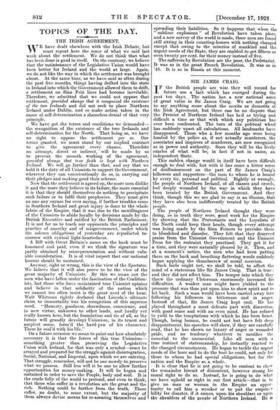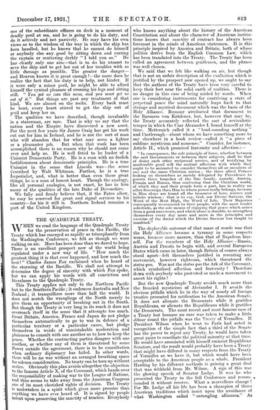SIR JAMES CRAIG.
F the British people are wise they will record for 1 future use a fact which has emerged during the past ten days. The nation has a new national asset of great value in Sir James Craig. We are not going to say anything more about the merits or demerits of the Irish Agreement, but there can be no dispute that the Premier of Northern Ireland has had as trying and difficult a time as that with which any politician has ever been confronted. The turn of the political wheel has suddenly upset all calculations. All landmarks have disappeared. Those who a few months ago were being hunted by the police as, if not actually murderers, the associates and inspirers of murderers, are now recognized as in power and authority. Soon they will be the lively oracles of what will be, in fact if not in name, an independent State.
This sudden change would in itself have been difficult enough to deal with, but with it has come a bitter sense of disillusionment on the part of Sir James Craig's followers and supporters—the men to whom he is bound by every tie, personal and political. Rightly or wrongly, the people of Northern Ireland, of all classes and creeds, feel deeply wounded by the way in which they have been treated by the British Government. And they think, though this we are glad to say is an illusion, that they have also been indifferently treated by the British people. The people of Northern Ireland thought they were doing, as in truth they were, good work for the Empire by showing that the Protestants and the Loyalists of the North could keep their heads, though every attempt was being made by the Sinn Feiners to provoke them to bloodshed and disorder. They felt that they deserved praise from the Unionist Government and the Unionist Press for the restraint they practised. They got it for a time, and they were naturally pleased by it. Then, and at a moment's notice, the men who had been patting them on the back and breathing flattering words suddenly began applying the thumbscrew of moral coercion. Such facts ought not, we shall be told, to affect the mind of a statesman like Sir James Craig. That is true ; and they did not affect him. The temper into which they threw the ordinary Ulsterman enormously increased his difficulties. A weaker man might have yielded to the pressure that was thus put upon him to show spirit and to hit back. Such a man would have been carried away into following his followers in bitterness and in anger. Instead of that, Sir James Craig kept cool. He has played throughout a most delicate part with discretion, with good sense and with an even mind. He has refused to yield to the temptations with which he has been beset. Though, being human, he could not but have felt deep diappointment, his speeches will show, if they are carefully read, that he has shown no luxury of anger or wounded pride, and no tendency whatever to sacrifice the essential to the unessential. Like alll men with a true instinct of statesmanship, he instantly reacted to the changed circumstances. He began to tackle the urgent needs of the hour and to do the best he could, not only for those to whom he had special obligations, but for the nation and the Empire as a whole. It is clear that he is not going to be content to chew the remainder biscuit of discontent, however strong his moral right to do so. Instead, he is going to do what we have upheld as right in our first article—that is, to give no man or woman in the Empire an oppor • tunity to call him a wrecker or to put the respons • bility for disaster, if it comes, upon his shoulders or upon the shoulders of the people of Northern Ireland. He 0 one of the subordinate officers on deck in a moment of deadly peril at sea, and he is going to do his duty, and do it actively and not passively. He may have his own views as to the wisdom of the way in which the ship has been handled, but he knows that he cannot do himself or anybody else any. good by sitting down and cursing the captain or muttering darkly " I told you so." He has clearly only one aim—that is to do his utmost to save the ship and to get her out of her troubles with as little damage as possible. The greater the danger— and Heaven knows it is great enough !—the more does he realize the fact that his duty is to help, not hinder. If it were only a minor peril, he might be able to afford himself the cynical pleasure of crossing his legs and sitting still. " You got us into this tness, and you must get us out of it.". But things are past any treatment of that kind. We are almost on the rocks. Every back must be bent, every heart stirred to get the ship out of peril and keep her so. • The qualities we have described, though invaluable in a statesman, are rare. That is why we say that the nation and the 'Empire have discovered a new asset. For the next few years Sir James Craig has got his work cut out for him in Ireland, and he is not the sort of man who will abandon that for what may seem a lighter or a pleasanter job. But when that work has been iccomplished there is no reason why he should not come Dyer and help us. He is well fitted to be leader of a Unionist Democratic Party. He is a man with no foolish fastidiousness about democratic principles. He is a true Unionist in the sense that Lincoln was—the sense described by Walt Whitman. Further, he is a true imperialist, and, what is better than even these great things, he is a man of honest heart. Though the analogy, like all personal analogies, is not exact, he has in him many of the qualities of the late Duke of Devonshire. We fully and firmly believe that, if the Fates allow, he may be reserved for great and signal services to his country—for his it still is. Northern Ireland remains a part of the United Kingdom.







































 Previous page
Previous page